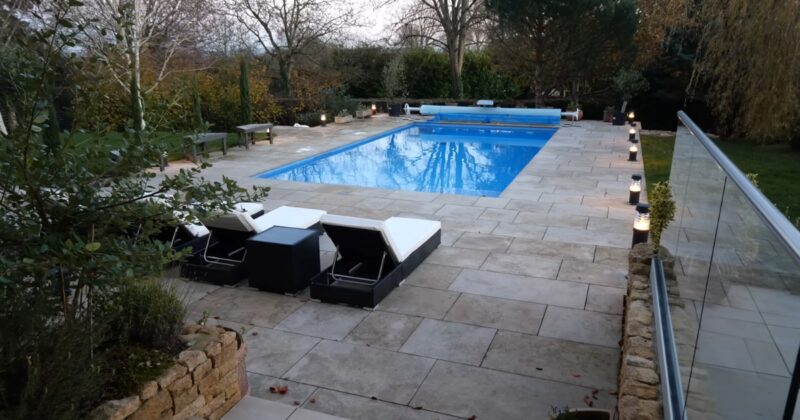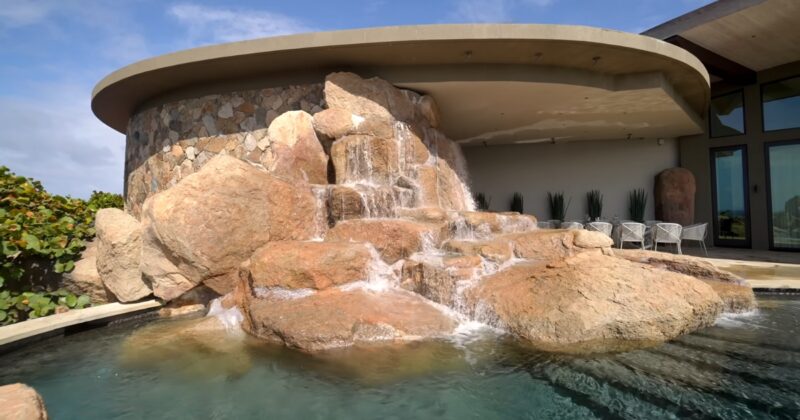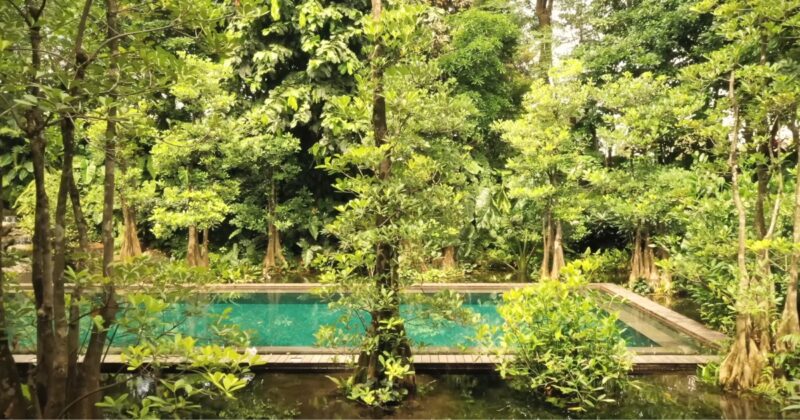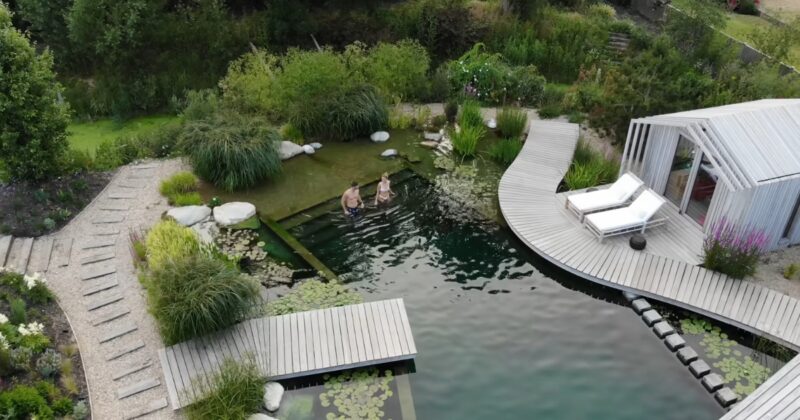Swimming pools are the centerpiece of fun, relaxation, and sometimes luxury in our homes or community centers. But, with growing concerns over environmental sustainability, it’s important to consider how our choices affect the planet.
The most environmentally friendly pool minimizes water usage, reduces chemical reliance, and incorporates energy-efficient systems. Let’s break down the options and factors that make a pool green and eco-friendly, in a way that’s easy to grasp.
What Makes a Pool Environmentally Friendly?
Several key factors contribute to the environmental footprint of a swimming pool:
- Water conservation: How the pool design and maintenance practices save on water.
- Energy efficiency: The use of energy-saving technologies and designs.
- Chemical use: Reducing or eliminating harmful chemicals in pool maintenance.
- Sustainable materials: Choosing materials that have a lower impact on the earth.
The Little Pool Co offers luxury plunge pools that can be easily installed in various settings, including above-ground, in-ground, and on apartment rooftops. They are designed for simplicity and ease of installation, requiring just a level concrete pad and electrical connection.
The pools feature Ceramic Core technology for enhanced durability and are available in several models, including the Relax and Plunge ranges, with various dimensions to fit different spaces.
Water Conservation Techniques

Conserving water is crucial for an eco-friendly pool. Here are a few strategies:
- Covers: Pool covers reduce evaporation, a major source of water loss.
- Recirculating systems: Advanced filtration systems that clean and recirculate water, reducing the need to frequently refill the pool.
Energy Efficiency: How to Achieve It?
Energy efficiency can be significantly improved through:
- Solar heating: Utilizing solar panels to heat pool water reduces reliance on fossil fuels.
- Efficient pumps and filters: Modern, energy-efficient models use less electricity.
Reducing Chemical Use
Minimizing or completely avoiding harsh chemicals not only benefits the environment but also the swimmers’ health.
- Saltwater pools: These use a process called electrolysis to clean the pool, reducing the need for chlorine.
- Natural pools: Mimicking a natural pond, these pools use plants and natural biological processes to purify the water.
Choosing Sustainable Materials
The construction materials for your pool can also impact its environmental friendliness.
- Eco-friendly concrete: Some concrete options have recycled content or lower carbon footprints.
- Recycled plastics or glass for liners: These materials reduce waste and often require less energy to produce.
What Is the Most Environmentally Friendly Pool?

Considering all factors, natural swimming pools stand out as the most environmentally friendly option. They work with nature, not against it, to create a clean and healthy swimming environment.
How Do They Work?
Natural pools rely on plants and a natural filtration system to clean the water. They have two main zones:
- Swimming zone: The area designated for swimming.
- Regeneration zone: Contains aquatic plants that naturally clean the water.
Benefits of Natural Pools
- No chemicals: These pools do not use any harsh chemicals, making them safe for the environment and your health.
- Lower energy use: They require less energy to maintain since they use natural processes for water purification.
- Water conservation: They lose less water to evaporation compared to traditional pools, thanks to their natural cover and ecosystem.
How to Make Traditional Pools More Eco-Friendly?
Not everyone can install a natural pool, but there are ways to make conventional pools more environmentally friendly:
- Install a solar pool heater: This can significantly reduce your pool’s energy consumption.
- Use a pool cover: To minimize water evaporation.
- Opt for an energy-efficient pump: These pumps use up to 75% less energy than standard pumps.
Making Informed Choices

When planning for a pool, considering the environmental impact is crucial. Here’s a quick checklist to guide your decision:
- Opt for a natural pool if possible: They are the most eco-friendly option.
- If choosing a traditional pool, make it green: Implement energy-saving and water-conserving technologies.
- Educate yourself on maintenance: Sustainable maintenance practices can greatly reduce a pool’s environmental impact.
Can You Swim in a Natural Pool All Year Round?
One common question about natural pools is their usability throughout the seasons. The answer largely depends on your climate:
- In warmer climates, natural pools can be used year-round, much like traditional pools.
- In colder climates, they may freeze over in winter, similar to a pond. However, some people enjoy ice swimming, which could be an option.
Adapting Your Pool for Cooler Months
For those in cooler climates wishing to extend their swimming season, consider these tips:
- Solar covers: These can help retain heat in the water during cooler months.
- Natural pool design: Designing your pool with a deeper area can help retain heat better.
Innovations
The world of eco-friendly pools is constantly evolving, with new technologies and methods emerging to make pools more sustainable:
- Robotic cleaners: These energy-efficient devices keep pools clean without the need for excessive chemicals.
- Variable speed pumps: These pumps adjust their speed to the pool’s needs, saving a significant amount of energy.
FAQs
What about the wildlife in natural pools?
They attract wildlife, such as frogs and birds, which can benefit the pool’s ecosystem by helping control pests naturally.
Can eco-friendly pools be heated?
Yes, eco-friendly pools can be heated using solar panels or solar pool covers, providing a sustainable way to extend the swimming season without excessive energy use.
Do natural pools attract mosquitoes?
No, properly maintained ones do not attract mosquitoes, as the moving water and aquatic life prevent mosquitoes from breeding.
Can I convert my traditional pool into a natural one?
Yes, it’s possible to convert a traditional pool into a natural one by adding a regeneration zone and adapting the filtration system to support natural cleaning processes.
Are eco-friendly pool materials more expensive?
Initially, some materials and technologies may have a higher upfront cost, but they often lead to long-term savings on energy, water, and maintenance costs.
Final Words
Choosing the most environmentally friendly pool means balancing your desire for a swimming pool with the responsibility to our planet. Natural pools offer a beautiful, sustainable option that brings a piece of nature into your backyard.
For those with traditional pools, implementing eco-friendly practices can still make a significant difference.
Keep in mind that every choice towards sustainability helps protect our environment for future generations. Whether through a full commitment to a natural pool or by making your conventional pool greener, you’re contributing to a healthier planet.
Related Posts:
- Connecting Kids to Nature: Making Ecology Homework…
- How to Reduce Your Pool's Environmental Impact - 2024 Guide
- Red Evergreen Shrubs For Your Yard: Vibrant…
- 6 Most Venomous Snakes in Florida - Lethal Serpents to Avoid
- 14 Most Common Animals in Panama - Biodiversity Spotlight
- Dog Breeds on B: Top 42 Most Popular Types - From…








